Choosing the right light bulb for your garage door opener isn’t just about brightness—it’s about finding the perfect balance of durability, compatibility, and performance. You’ve probably faced the annoyance of a flickering or burned-out bulb at the most inconvenient times.
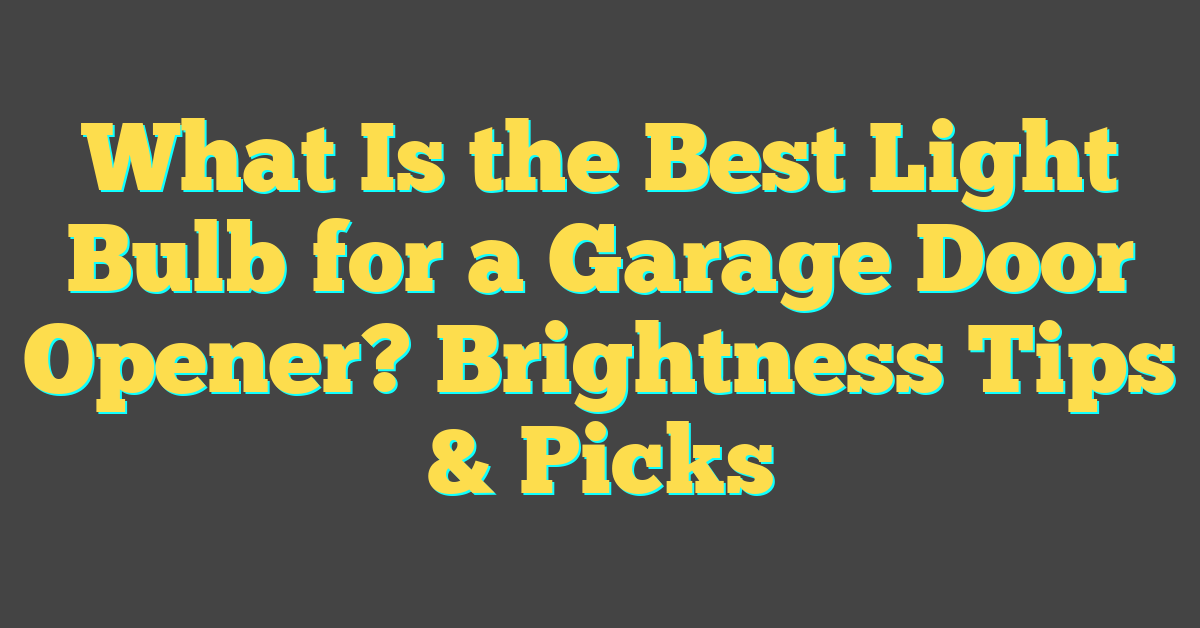
LEDs, CFLs, and halogens all clamor for your attention, but which one will stand up to the vibration and frequent on-off cycling of your garage door opener? Let’s shed some light on the best options out there to ensure you’re never left in the dark again.
The Importance of Choosing the Right Light Bulb for Your Garage Door Opener
Isn’t it frustrating when you’re in the middle of a home DIY project and your garage light starts flickering? That’s why selecting the right light bulb for your garage door opener isn’t just a trivial decision – it’s critical to keeping your workspace well-lit and functional.
Firstly, consider the durability of the bulbs you’re looking into. Garage door openers can cause vibrations each time they’re activated, so you need a light bulb that won’t fizzle out after a few weeks. Look for labels that mention rough service or garage door compatibility; these bulbs are designed to withstand the rattle and roll of your opener’s daily grind.
The technology of the bulbs also plays a pivotal role. For instance, LED bulbs are a fantastic choice because they use less energy and last way longer than traditional incandescent bulbs. Plus, they don’t mind the cold—ideal for those of you living in chillier climates.
Another must-consider is compatibility. Not all light bulbs are going to play nice with your garage door opener. Some LED and CFL bulbs can interfere with the opener’s radio frequency, causing operational issues. To avoid any inconveniences, check if the bulb is specced for use with garage openers.
Let’s talk wattage and brightness. You’ll want your garage to be well-lit without going overboard. A bulb with too high wattage might not only be unnecessary but could also shorten the life of the opener. Generally, a LED bulb in the range of 800 to 1,400 lumens should provide ample lighting for most garages.
With the right light bulb, your garage can become a bright and reliable workshop where you can tinker and fix to your heart’s content. After all, isn’t diving into a new project easier when you’ve got the perfect lighting? Keep your DIY spirit glowing strong with a light bulb that’s as resilient and capable as you are.
Understanding the Different Types of Light Bulbs
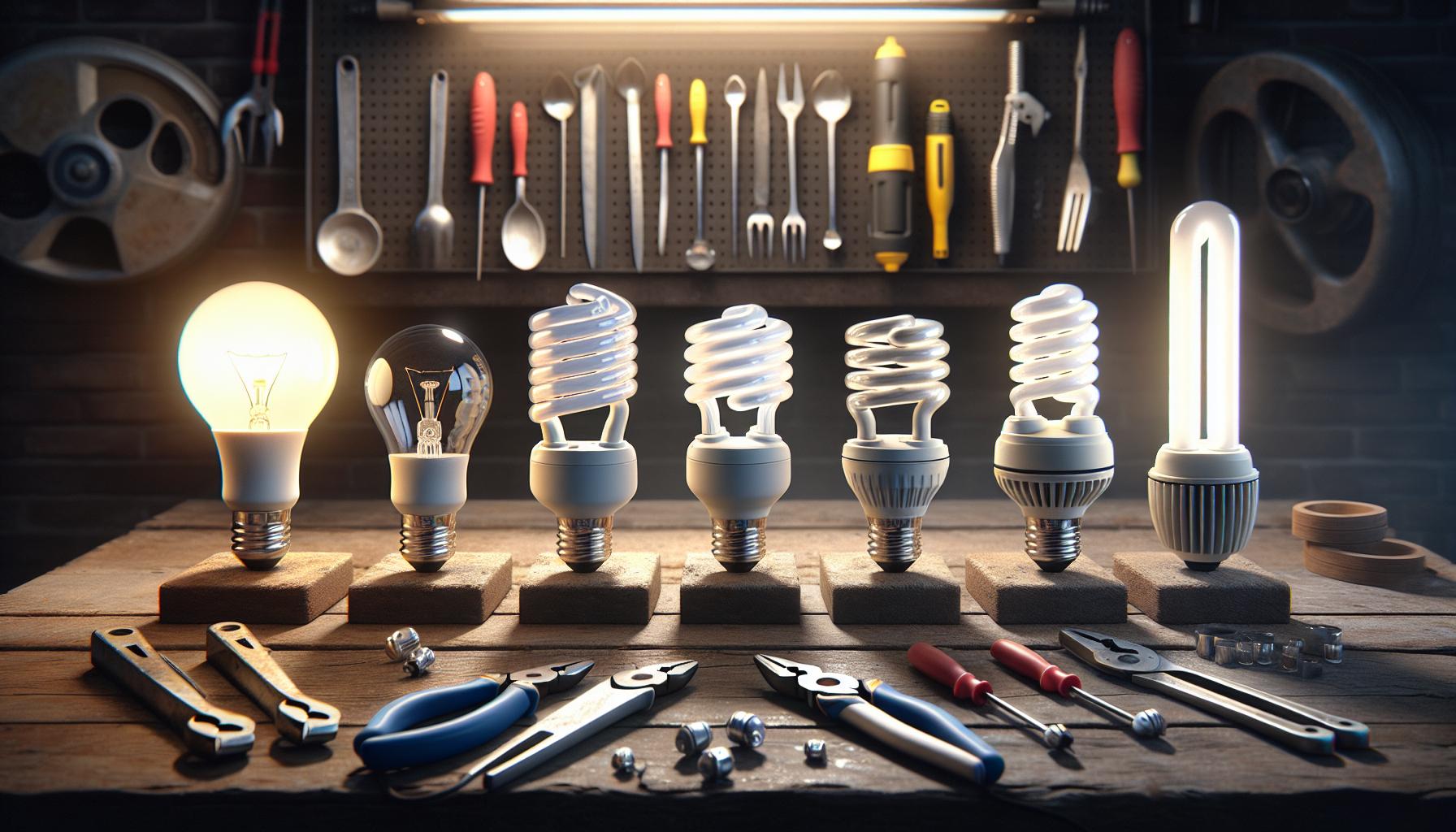
When you’re embarking on your DIY journey to improve your home’s lighting, getting to know the various light bulbs on the market is a pivotal step. As a lighting aficionado, you’ll find that each type of light bulb brings its unique features to the table.
Incandescent bulbs have been illuminating homes for more than a century and are known for their warm, inviting glow. However, their short lifespan and inefficiency often overshadow their initial affordability. If you’ve got a garage space that doubles as a workshop, you probably know that frequent bulb replacement is less than ideal.
Moving on, there’s the CFL, or compact fluorescent lamp. These spiraled wonders consume less power than incandescents and last longer too. But here’s the kicker—CFLs can be sensitive to extreme temperatures and vibrations, which doesn’t bode well for the rough-and-tumble environment of a garage.
Then, there’s the modern hero of the lighting world, the LED bulb. It’s like the Swiss Army knife in your lighting toolkit—durable, energy-efficient, and boasting an impressive lifespan. LED technology has come a long way, providing a range of color temperatures to suit any ambience you’re aiming for, even in a garage.
But before you dive in, let’s not forget about halogen bulbs. These are the intense, focused light sources you’ll often find in car headlights. While they’re energy-efficient, their high operating temperatures can make them a less suitable choice for an enclosed space, where you’d store your Christmas decorations next to paint cans.
As you navigate your options, bear in mind that the best light bulb for your garage door opener isn’t just about illumination—it’s also about endurance and capability. It’s essential to consider how these bulbs perform in an environment subject to constant vibration and temperature fluctuation. Choose wisely, and you’ll shine a light on a more reliable, efficient workspace.
Factors to Consider for Garage Door Opener Light Bulbs
« Why Don’t Light Bulbs Last? Discover the Shocking Reasons Behind Their Short Lifespan
Is Light Bulb Harmful for Eyes? Protect Your Vision with These Tips »
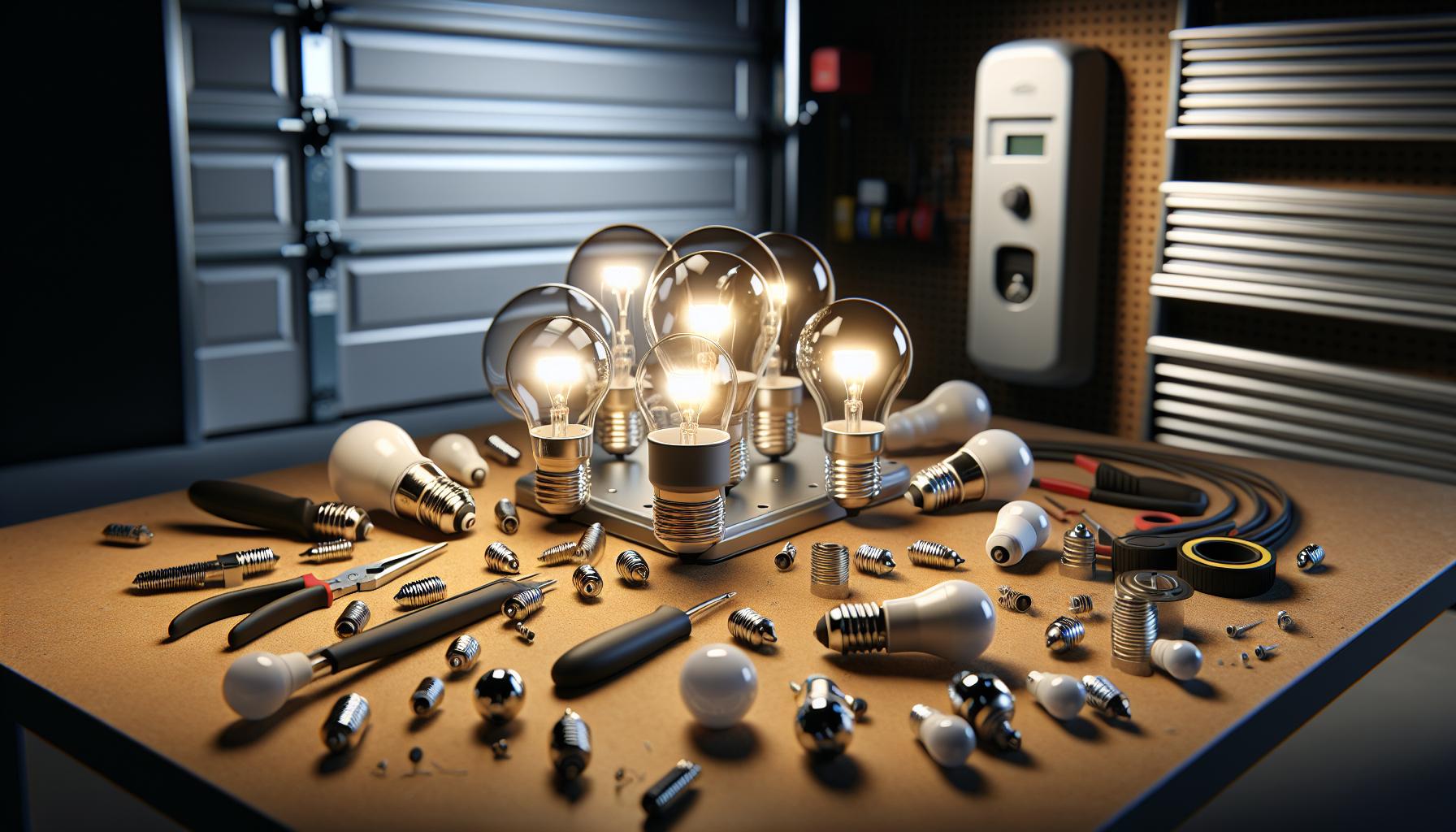
When selecting the best light bulb for your garage door opener, there are several factors you need to weigh in. The right choice can save you money, time, and the hassle of frequent changes, especially since garage door openers can be a bit high to reach.
Bulb Type Compatibility
Your garage door opener might not be compatible with all bulb types. Check the user manual for bulb specifications. Some openers are designed for specific bulb shapes or bases, and using the wrong type can lead to malfunctions or even damage to your opener.
Vibration Resistance
Garage doors generate a lot of vibrations when they operate. This can shorten the lifespan of traditional light bulbs. Look for bulbs specifically labeled as vibration-resistant. LED bulbs are often the best choice here, as they’re sturdier and less prone to breakage from constant shaking.
- Incandescent Bulbs: Tend to break easily under vibration
- CFLs: Sensitive to vibrations, risk of mercury spill if broken
- LED Bulbs: Resilient against vibrations, no filament to break
Temperature Tolerance
Garages can be subject to extreme temperature variations, which can affect bulb performance:
- Heat: Halogen bulbs may not be ideal in a hot garage as they already operate at high temperatures.
- Cold: CFLs can take longer to reach full brightness in cold conditions.
LED bulbs, on the other hand, are less sensitive to temperature fluctuations, maintaining consistent performance regardless of the weather outside.
Brightness and Color Temperature
The amount of light (lumens) and the color temperature (measured in Kelvins) are crucial for visibility and comfort. Choose a bulb with sufficient brightness to illuminate your garage without being blinding. The color temperature will affect how the light feels, with cooler tones usually preferred for task lighting in a garage.
| Type | Brightness (Lumens) | Color Temperature (Kelvins) |
|---|---|---|
| LED Bulbs | High | 5000K – 7000K |
| CFLs | Medium | 2700K – 5000K |
| Halogens | Medium-High | 2700K – 5000K |
| Incandescents | Low | 2700K – 3000 |
The Benefits of LED Light Bulbs
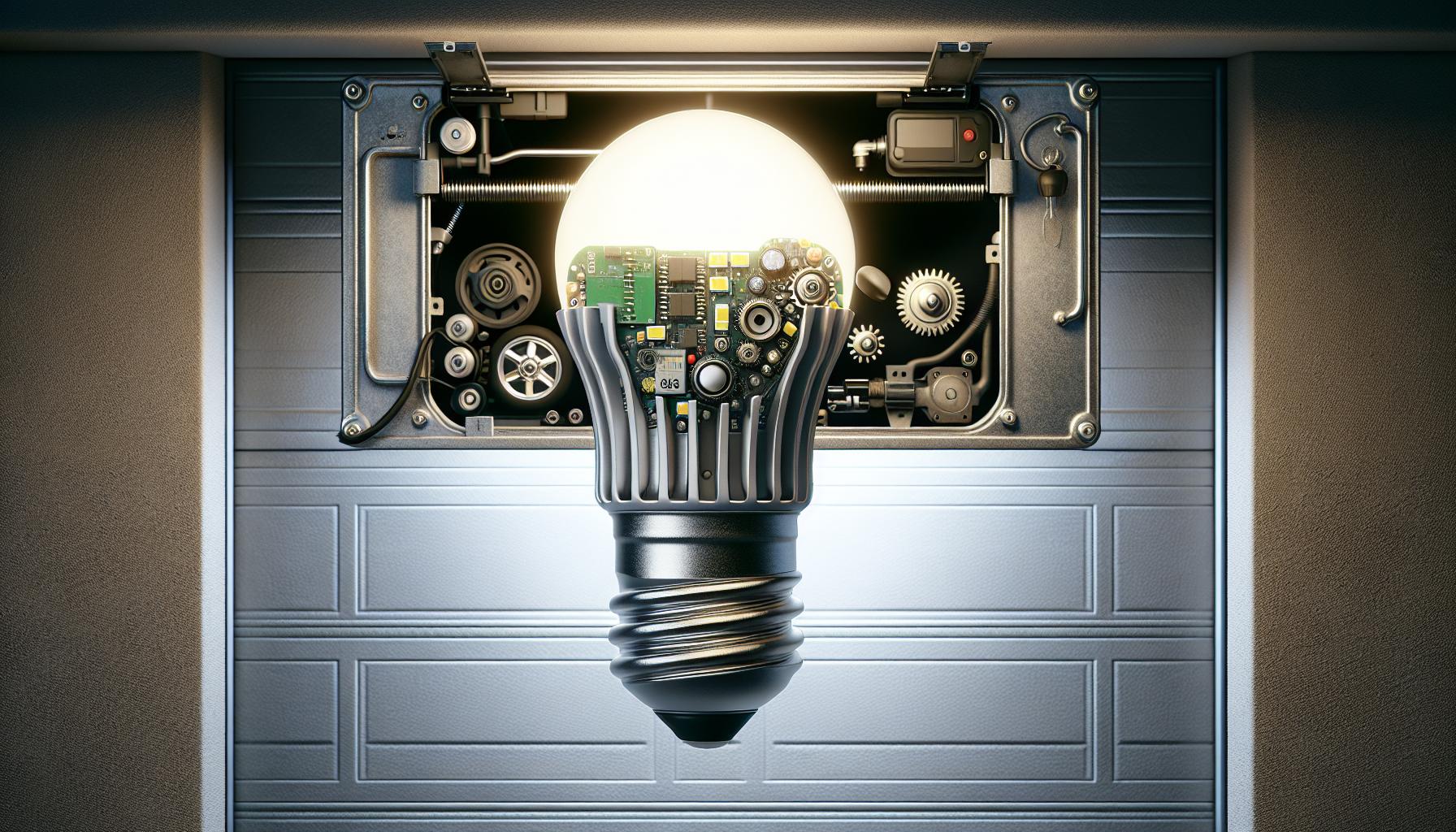
When you’re knee-deep in home DIY projects, lighting is a component you can’t afford to overlook, especially in areas like your garage. LED light bulbs stand out as exceptional choices for garage door openers, and here’s why.
LED bulbs consume significantly less energy than their incandescent or halogen counterparts. This means you’ll see a noticeable dip in your electricity bills. On average, LEDs use about 75% less energy and last 25 times longer. That’s not just pennies saved; it’s dollars in your pocket for your next DIY adventure.
Besides energy efficiency, LEDs are designed to withstand rough conditions. Garage door openers can generate a lot of vibrations, which can spell disaster for traditional bulbs. But not for LEDs, they’re built tough to handle the shake-up every time your door rumbles open or close.
Let’s talk color temperature. With LEDs, you can choose the exact hue to suit your garage’s needs. Whether you favor a cool daylight feel or a warmer glow, LEDs have you covered. Here’s a simple breakdown:
| Color Temperature | Description |
|---|---|
| 2700K – 3000K | Warm, inviting light |
| 3000K – 4500K | Clean, neutral appearance |
| 5000K – 6500K | Daylight, alertness boost |
Consider the climate you live in. Extreme cold or heat might have affected your old bulbs, but LEDs laugh in the face of such extremes. Their performance doesn’t flicker, regardless of whether you’re sweating in the summer heat or shivering in the winter chill.
Also, let’s not forget the environmental angle. By using LEDs, you’re doing your part for the planet. They’re free of toxic elements like mercury, which plague other bulbs types, making both using and disposing of LEDs a greener choice.
Plus, setting up an LED bulb is a breeze. You won’t need to be an electrician to get them working, and once they’re up, they almost demand you forget about them — they’re that low-maintenance.
Finding the Right LED Light Bulb for Your Garage Door Opener
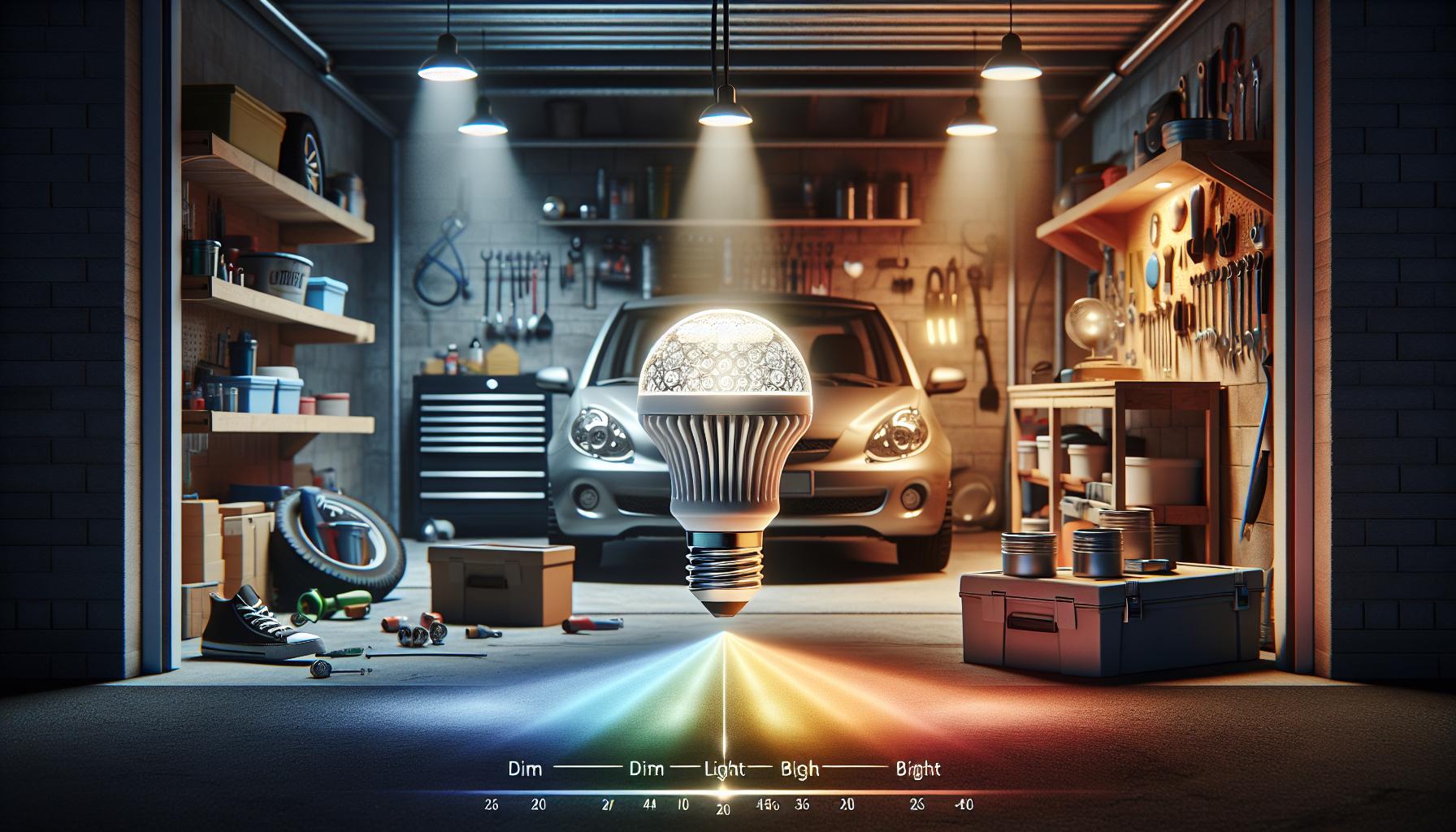
Discovering the perfect LED bulb for your garage door opener is all about matching your specific needs with the right features. Think of it like finding a trusty sidekick for your garage – it’s about compatibility and performance. As a DIY enthusiast and a lighting aficionado, you’ll want to pay attention to bulb brightness, measured in lumens, and the color temperature, which is indicated in kelvins (K).
Brightness is key when you’re trying to navigate the garage without tripping over tools or bumping into your car. The lumen output you need partially depends on the size of your space. Here’s a simple guideline:
| Garage Size | Recommended Luminosity |
|---|---|
| Small | 500 – 700 lumens |
| Medium | 700 – 1,000 lumens |
| Large | 1,000 – 1,400 lumens |
Another detail to consider is the color temperature of the bulb. A warm light (around 3000K) creates a cozy atmosphere, while cooler whites (above 5000K) offer a vivid, daylight-like quality that’s great for task lighting.
- Opt for a 3000K to 4000K range for a balanced, inviting glow
- Choose above 5000K for clear, bright illumination suitable for detailed work
Be sure also to check the compatibility of the LED bulb with your garage door opener model. Some openers might have restrictions on the type or wattage of bulbs used. Most modern LED bulbs, designed specifically for garage door openers, are built to minimize radio frequency interference, ensuring your opener functions without a hitch.
Finally, consider the robustness of the bulb. LEDs renowned for their durability should exhibit strong resistance to the unique vibrations caused by garage doors in motion. Check for bulbs labeled as “shatter-proof” or “vibration-resistant” to ensure long-lasting performance.
Conclusion
So there you have it. Choosing the best LED light bulb for your garage door opener is all about balancing brightness, color temperature, and compatibility with your system. Remember, the right bulb not only illuminates your space but also enhances the functionality of your garage door opener. Don’t overlook the importance of a bulb that can handle the vibrations either. With these tips in mind, you’re well on your way to a well-lit, efficient garage that meets all your needs. Happy lighting!
Frequently Asked Questions
What lumen output is recommended for garage LED light bulbs?
The recommended lumen output for garage LED light bulbs depends on the size of the garage. A standard size garage typically requires a bulb with a lumen output ranging from 800 to 1,500 lumens.
How does color temperature affect the atmosphere in a garage?
Color temperature influences the atmosphere by providing different shades of light. A warm color temperature creates a cozy atmosphere, while a cooler color temperature offers a brighter, work-friendly environment.
How do I know if an LED bulb is compatible with my garage door opener?
To ensure compatibility, check the manufacturer’s specifications for your garage door opener model. They generally list compatible bulb types or any restrictions.
Can regular LED bulbs withstand the vibrations from a garage door?
Not all LED bulbs are built to withstand vibrations. It’s important to choose an LED bulb that is specifically designed to be vibration-resistant for use in garage door openers.
Why is choosing the right LED light bulb for my garage door opener important?
Selecting the right LED bulb ensures the right brightness and atmosphere in your garage, while also making sure that the bulb lasts longer by being compatible and robust enough to handle the vibrations of the garage door opener.




